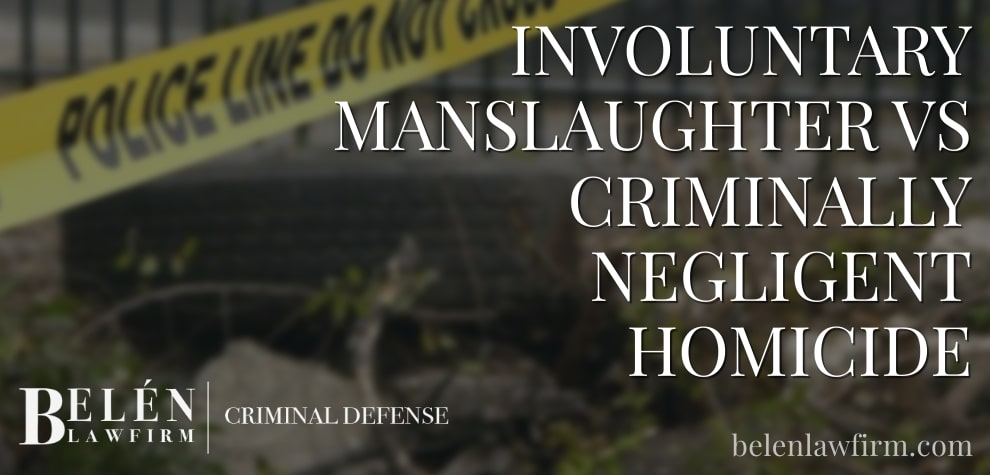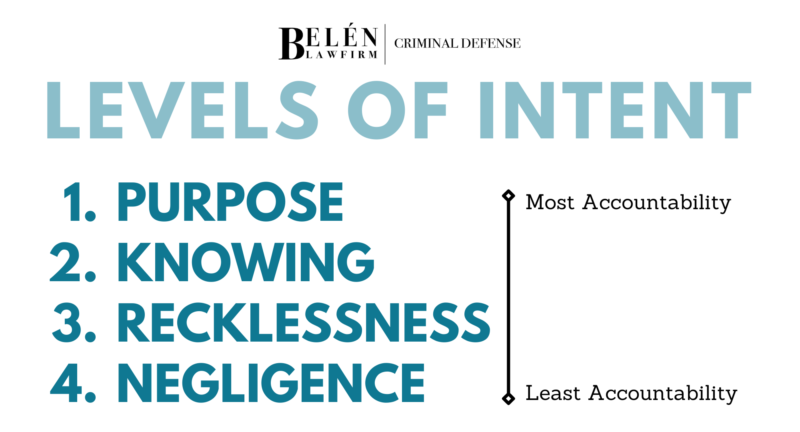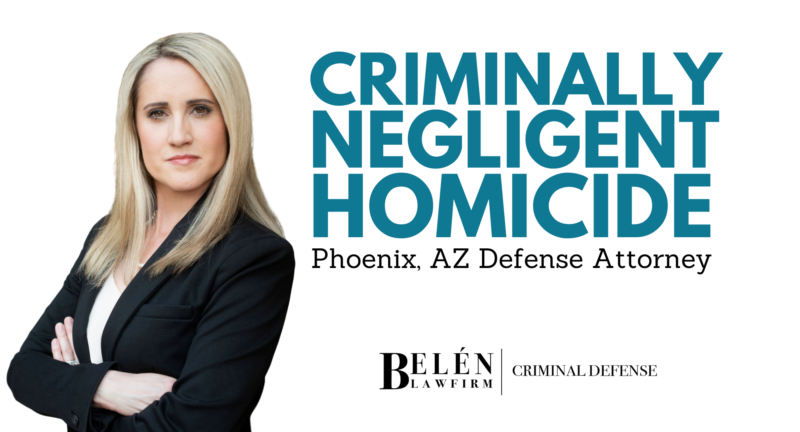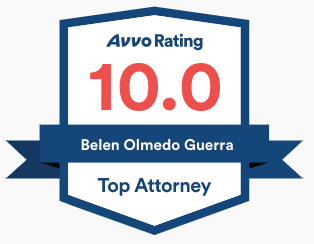Involuntary manslaughter and negligent homicide both describe a criminal charge that involves the death of another person. However, while they both concern the act of killing someone, they differ from the more severe crimes of first-degree murder and voluntary manslaughter. The difference comes from the intention behind the death and whether or not it was a premeditated act.
In this post, our Phoenix criminal defense attorneys at Belén Law Firm will go into further detail about the differences between involuntary manslaughter and criminally negligent homicide in the state of Arizona. It will also cover what to do if you or a loved one has been charged with one of these crimes.
What Is Considered Manslaughter?
Manslaughter is one of the criminal charges that may be given to an individual who is responsible for the death of another person. However, this charge is less severe than that of murder and often results in a lesser sentence or punishment. There are two types of manslaughter: involuntary or voluntary. The charge assigned depends on the circumstances surrounding the case and the intent behind the act.
Intent can be broken down into four different components. These include: purpose, knowing, recklessness, and negligence. “Purpose” holds the most accountability, with decreasing accountability from “knowing” all the way down to “negligence.”
Voluntary Manslaughter in Phoenix
Voluntary manslaughter is the more serious of the two manslaughter charges and falls into the uppermost categories of “purpose” or “knowing” in the level of intent. “Purpose” means that the person committed the crime willingly and with a specific intention in place. “Knowing” means the person committed the crime with the knowledge that the actions would likely bring a certain outcome.
What separates voluntary manslaughter from murder is what is referred to as the heat of passion. This means that the perpetrator faced an overwhelming surge of emotion at the time of the incident and, as a result, lost all sense of reasonable judgment which resulted in them taking another person’s life. It does not excuse the act or behavior, but instead gives a small sort of loophole for people who are proven to have been strongly provoked or overwhelmed at the time of the death’s occurrence.
Involuntary Manslaughter in Phoenix
Involuntary manslaughter in Phoenix occurs when the level of intent falls into the lower categories of “recklessness” or “negligence.” Recklessness occurs when an individual acts in a reckless manner, creates a substantial and unjustifiable risk, and ignores the consequences that may result from their actions. Negligence holds the least accountability and is the result of an individual failing to recognize the extent of the risk in his or her behavior.
What Is Criminally Negligent Homicide?
In Arizona, criminally negligent homicide is a type of involuntary manslaughter. This means an act of recklessness or negligence caused the death of another person. The death must not have been intentional or planned in any way. Rather, criminally negligent homicide occurs as the result of an accident. The most common type of involuntary manslaughter, or criminally negligent homicide, is vehicular homicide. Most often, this occurs when an individual commits a DUI offense in Arizona, meaning they were driving under the influence of drugs or alcohol and caused an accident that resulted in another’s death. Speeding, distracted driving, and otherwise reckless or unlawful driving are other forms of criminally negligent behavior that may also result in a criminally negligent homicide charge.
Other cases of criminally negligent homicide can include deaths that are a direct result of carelessly firing a weapon into the air or into a crowd, hunting accidents, leaving a child in a hot car, a fight or physical altercation, or starting a fire. In some jurisdictions, including Arizona, accidents that cause the death of an unborn child at any stage of development are also considered to be a criminally negligent homicide. (Keep in mind, however, that this does not apply to medical professionals performing a consented abortion or if the accident was caused by the mother of the child.)
Essentially, criminally negligent homicide is any type of accidental death caused by the reckless or negligent behavior of an individual.
Criminally Negligent Homicide vs Involuntary Manslaughter
Involuntary manslaughter and criminally negligent homicide in Arizona are fundamentally the same. The terminology that is used comes down to what jurisdiction the crime falls under. In some cases, jurisdictions may use the term “criminally negligent homicide” to refer to a crime that does not meet the level of recklessness it takes to be considered manslaughter. The use of either term is subjective to the case itself and depends on the area where the criminal negligence took place. For the prosecution to prove criminal negligence, they must be able to show that any reasonable person in your situation would have known that their behavior leading up to the death was potentially dangerous. Your criminal defense attorney will be able to explain to you in detail which terms apply to your case.
Is Negligent Homicide A Misdemeanor?
Some states classify first offense negligent homicide as a misdemeanor (with the exception of DUI cases), while others classify it as a felony. In the state of Arizona, however, criminally negligent homicide is a Class 4 felony.
The difference between a misdemeanor and a felony is that a misdemeanor is less serious and, as a result, has smaller sentences and fines than a felony. Felonies, on the other hand, are the most serious crime an individual can commit. They can result in longer jail time, a higher number in fines, and sometimes a permanent loss of certain rights or freedoms.
How Many Years Can You Get For Negligent Homicide?
If you have been convicted of a felony of any kind, you can expect to face a potentially lengthy prison sentence. However, there are certain factors that determine just how long a prison sentence may be. Different sentences are given out for dangerous and non-dangerous felony offenses of negligent homicide. The crime is dangerous if the homicide involved the use of a dangerous instrument or deadly weapon. A dangerous instrument is defined legally as “any instrument, article, or substance which, under the circumstances in which it is used, attempted to be used, or threatened to be used, is highly capable of causing death or serious physical injury.” This may be anything from a tire iron to a large rock. If a weapon or dangerous instrument was not used in the homicide, it is considered a non-dangerous felony.
Penalties for Criminally Negligent Homicide
In Arizona, the first offense for non-dangerous negligent homicide is met with a minimum sentence of 1 year in prison and a maximum of up to 3.75 years. For non-dangerous repeat offenders, the sentence will raise to a minimum of 2.25 years and up to 7.5 years maximum. In addition to prison time, both first-time and repeat offenders are required to serve probation.
The involvement of a weapon in a negligent homicide case would increase the charge to a dangerous offense. As a result, the sentence would increase to a minimum of at least 4 years and a maximum of 8 years.
Both dangerous and non-dangerous offenses of negligent homicide will result in a permanent criminal record, requiring the offender to register as a felon, and the confiscation of any firearm licenses.
To have a better idea of what your penalties may look like for your specific case, speak to a criminal defense attorney in your area today.
Call For A Free Initial Consultation
If you or someone you love has been convicted of involuntary manslaughter or criminally negligent homicide, you are probably unsure of your next move. You need someone on your side who will fight hard for you and your future. Belén Law Firm is a top Phoenix Criminal Defense Law Firm and will work in your defense to achieve the best possible outcome for your situation, whether that’s a not guilty verdict, a reduced sentence, or even a case dismissal. Once a formal attorney-client relationship is established, she will be able to provide you with unmatched legal advice and get straight to work building a case against your criminal negligence charge. Contact an Arizona murder defense attorney at Belén Law Firm today to discuss your case. We offer free case evaluations and are available 24/7. You can reach us at 602-715-0908 or by submitting an online intake form.
























